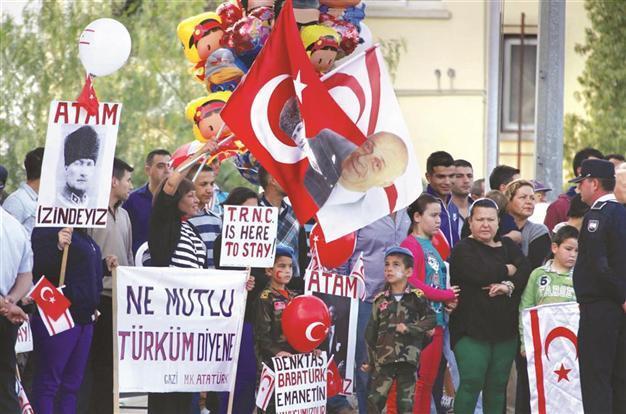Turkish Cypriot state at 30: How independent?
NICOSIA - Hürriyet Daily News

People attend the celebrations of the 30th anniversary of the foundation of the Turkish Cyprus in Nicosia. AFP photo
Thousands of Turkish Cypriots cheerfully flocked to downtown Nicosia on Nov. 15 to share the joy of the 30th anniversary of the foundation of the Turkish Republic of Northern Cyprus, but questions remain as to the island territory’s future.Amid the events, the Turkish Cypriots are on one hand attempting to convince Greek Cypriots to negotiate for the reunification of the island while also trying to stand on their own feet economically, politically and socially.
The current picture, however, depicts a state almost fully dependent on its motherland, Turkey, raising questions on the genuineness of its independence.
With its population of nearly 300,000 and 3,355-square-kilometer area (accounting for nearly 37 percent of the island), the Turkish Cypriot state enjoys $15,000 per capita, according to the Turkish Cypriot Chamber of Commerce. The annual growth rate is around 4 percent, but nearly 10 percent of the population is unemployed; in addition the fact that the territory’s economy is mainly based on revenues from tourism and higher education has done little to make living standards better.
Tourism and higher education
“Unfortunately we have failed to diversify our revenues. Some 70 percent of our GDP comes from two sectors: tourism and higher education. We should have exerted more efforts to generate a competitive private business sector,” Salahi Serakıncı, vice president of the Turkish Cypriot of Chamber of Commerce, told a group of visiting journalists on Nov. 14.
Serakıncı complained about the international sanctions imposed on them, asking: “How will we trade? We can’t even sell a bottle of water in southern Cyprus. Trade sanctions on us do not help us to increase the competitiveness of the Turkish Cypriots business community.”
The figures highlight Turkey as the main trade partner of the Turkish Cypriots, but the motherland’s economic activity is not limited with trade. Sponsoring the island’s fragile economy with direct money flow – up to around $1 billion every year – the Turkish government has undertaken a massive economic restructuring mission which has begun causing harsh debates in northern Cyprus.
“Important steps have been taken with regard to strengthening the TRNC’s public finances. There can always be discussions [on these issues], but these are part of democracy. We should focus more on long-term benefits instead of tackling them with short-term gains,” Deputy Prime Minister Beşir Atalay said in a statement on Nov. 15 as part of the 30th anniversary celebrations.
Turkey’s decision to appoint its fiscal grant-maker to northern Cyprus as its full ambassador has been regarded as Turkey’s intention to become more involved in Turkish Cypriot affairs.
“This has just been the case,” a member of Turkish Cypriot Parliament told the Hürriyet Daily News on the sidelines of the independence celebrations.
“In the past, Turkey appointed its brightest diplomats as the ambassador, but this appointment showed the Turkish government will always have a say on every domestic issue of the Turkish Cypriots. I can say that the only issue we are on the same page with Turkey is the Cyprus question. The rest, however, we are fully apart,” the member of Parliament said.
Atalay, as the Cabinet minister responsible for Cyprus and for carrying out projects like water transportation from Turkey to the island, frequently visits Nicosia but his interventions are not limited with economics. He is believed to have pushed the Republican Turkish Party United Front (CTP) to make a coalition with the National Unity Party (UBP) instead of the Democrat Party (DP).
According to the same member of Parliament, Turkish Prime Minister Recep Tayyip Erdoğan did not send a congratulatory message to new Prime Minister Özkan Yorgancıoğlu for building a coalition government with the DP.
Social restructuring?
Another dimension of the Turkish government’s interventionist moves is the social restructuring of the Turkish Cypriot state by placing more importance on the Muslim identity of the Turks living on the island.
“We are Muslim but we are ‘loose’ Muslims. Secularism is a well-established notion here,” an official told the HDN on the condition of anonymity.
No one is against the building of mosques, but the priority of the Turkish Cypriots is renovating school buildings, the official said. The number of mosques has risen to 190 recently while the number of schools is 160 in northern Cyprus, according to local press reports.
Another alleged demand of the Turkish government is to change the curriculum to provide more religious education so that future generations will be more pious.
“Who is it going to benefit making Turkish Cypriots resemble Turkey? Our culture, mentality and lifestyles are different from the mainland. We are of course Turkish and Muslim, and we are proud of it. But we are also proud of our independence. And if unification plans fail, the TRNC will continue to be our home,” another high-level government official added.
















